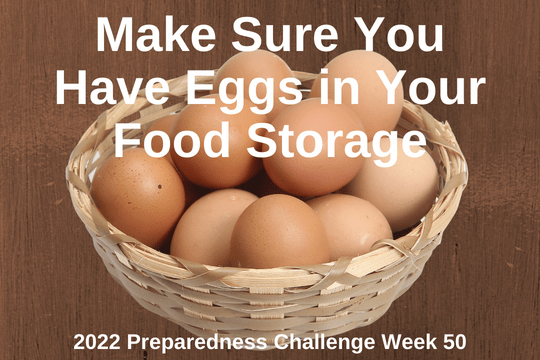
Eggs are a nutrient-dense super food, and it would be inconvenient to live without them. Eggs are not only a versatile breakfast food, but they are also foundational in quiches, frittatas, crêpes, meringues, custards, French toast, eggnog, puddings, custards, creams, soufflés, etc. Eggs perform vital functions in many recipes and are an important ingredient in baked goods, mayonnaise, sauces, and as a binder in meatloaves and casseroles.
You really do want eggs in your food storage!
2022 Preparedness Challenge Week 50
This week the preparedness challenge is to add egg products to your food storage. Give some serious thought to how you can most effectively do this.
Keep a Supply of Fresh Eggs on Hand
The ideal choice is fresh eggs. Begin by keeping an extra dozen or two in your refrigerator and replenish as you use them. Fresh eggs keep for two to three months if they are refrigerated and about two weeks if unrefrigerated.
If you have the room and the inclination, consider raising your own chickens for a continuous supply of fresh eggs.
Another option is to store dehydrated or freeze-dried eggs which can be used in place of fresh egg for both eating and as a cooking ingredient.
This week add eggs to your food storage, either additional fresh eggs or dehydrated eggs.
Fresh Eggs—Raising Your Own Laying Hens
One way to ensure that you have eggs in a crisis is to raise your own laying hens.
During COVID, Craig built a stylish little chicken coop which we put on the upper terrace in our garden and fenced it off to protect the vegetables. He built the coop in two sections to make it portable so we could bring it closer to the house in a more protected area during the snowy months.

We started out with nine chickens—one died as a chick, one was a rooster that we gave to some friends, and one literally just dropped dead for seemingly no reason. Our six chickens yielded 24 or more eggs a week in their prime—younger chickens yield more, and they lay more in summer months. This fall their egg-laying slowed down to only one or two eggs a day, so we donated them to a family with a big flock of chickens. We plan to get more chicks this spring.
WHAT YOU NEED TO RAISE LAYING HENS
Chickens require a chicken coop and daily attention. You will need a good way to feed and water them to prevent them from contaminating their food or water. You will also need to store chicken feed—about 3.5 to 4 ounces a day per chicken. That’s close to 8 pounds a month per chicken. You should also store some scratch. Chickens are omnivores and like to eat surplus garden greens and veggies and they chow down on insects.
Caution: Before you decide to get laying hens, make sure there are no ordinances against raising chickens in your location!
Tips for Storing Fresh Eggs
FARM FRESH EGGS
If you are lucky enough to have fresh eggs, either from your own chickens or from a local farm, you probably know it is not necessary to refrigerate them. Fresh eggs have a natural protective coating called the bloom or cuticle. This seals the porous egg and protects the egg from bacteria. Fresh chicken eggs can store at room temperature for two to three weeks—use them within that time for optimal freshness, anyway.
It doesn’t hurt to refrigerate eggs, but once they have been refrigerated they should stay in the fridge since condensation will wash away the protective layer. They can be stored for two to three months in the refrigerator!
GROCERY STORE EGGS
Fresh eggs from the grocery store have been washed and pasteurized and need to be refrigerated. Depending on how fresh they were when purchased, most purchased eggs are good for four to five weeks.
HOW TO TEST THE FRESHNESS OF FRESH EGGS
If you are wondering how fresh your eggs are and if they are still good to eat, try the float test. Place the egg in a container of water. Fresh eggs sink to the bottom while less-than-fresh eggs float. If an egg floats on the top of the water you may want to discard it.
Powdered Eggs
Dry egg powders have been much improved in recent years and are a good replacement for fresh eggs. They are made in a spray-drying process that maintains nutrition, function, and for the most part, taste.
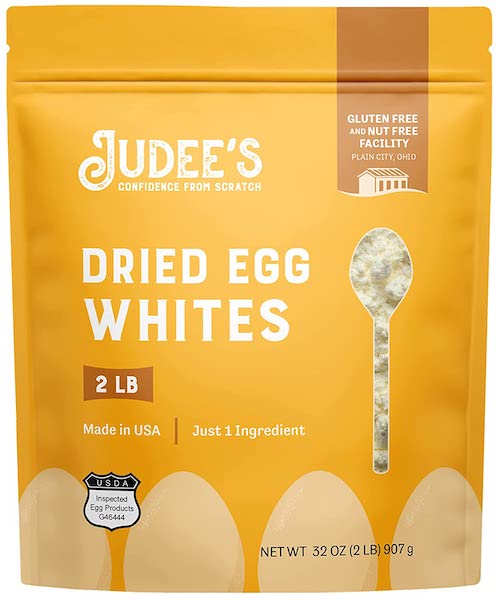
Dried egg powder comes as whole egg powder, egg-white powder, and egg-yolk powder. These are very versatile products and can be reconstituted and used as you would use fresh eggs. Egg powder can also be added directly to the dry ingredients in a baking recipe—just increase the liquid by two tablespoons per egg. Egg white powder is ideal to reconstitute and use for making meringues. Egg yolk powder can be used for making custards and puddings.
Powdered Scrambled Egg Mix
Powdered scrambled eggs are often used in the complimentary breakfasts at hotels chains because they are convenient, inexpensive, and store well. Powdered scrambled egg mix contains eggs along with powdered milk, vegetable oil, and salt. They will scramble nicely if you use a mixer to whisk them until they are a bit frothy. Adding bacon bits, green onions, peppers, etc. will make them more palatable. Scrambled egg mix can also be used for omelets, breakfast burritos, and French toast.
Selecting and Storing Dry Egg Powder
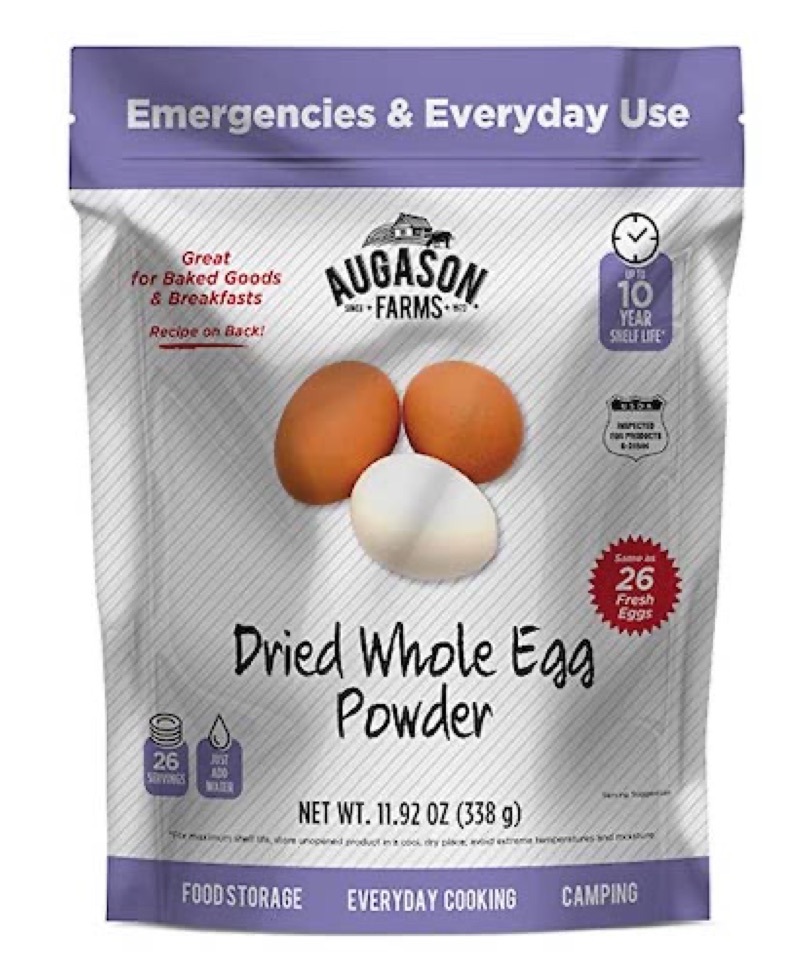
Dry egg powders are often sold by food storage companies in #10 cans with oxygen absorbers to prolong the shelf life. Although it is easy to store #10 cans, once the can is open, the dry egg powder attracts moisture and the quality begins to deteriorate. A better option is to store dry whole egg mix in small Mylar packets or in smaller #2½ cans.
Before purchasing large quantities, try a sample to be sure you like it and it works for your needs. Also check the country of origin and be sure that you are confident the product will be good quality.
What is the Storage Life of Dry Egg Powder?
Scrambled egg mix and whole egg powder both have a stated shelf life of up to ten years if properly stored in a cool, dark place. Be aware that shelf-life claims for dehydrated eggs may be exaggerated, especially if you want to use them in scrambled eggs or omelets. For best quality and to most resemble fresh taste, plan on a storage life of about two years and for use in baking about five years.
Egg powder readily absorbs moisture, making it lumpy and strong-flavored. High storage temperatures will damage flavor, solubility, and thickening ability. Once open, the shelf life is less than a year. Of course, after reconstituting, treat them like fresh eggs.
How Much Should You Pay for Powdered Eggs?
Powdered eggs are used commercially because of their convenience and because they are less expensive than fresh eggs. However, when they are repackaged for the consumer or food storage market, they may be two to three times more expensive than fresh eggs. Powdered eggs are commonly available online which makes it easy to compare prices. Try to find powdered eggs that are close in price to fresh eggs.
How to Figure Out How Much You are Paying Per Egg for Powdered Egg Products
As stated, powdered eggs mix that is repackaged for the consumer or food storage markets is more expensive than commercial powdered eggs. In my research for this blog, I found wildly varying prices for the same product. Before purchasing powdered egg products, I recommend that you calculate to see how much you are paying for the equivalent of one large egg. Shop carefully so you don’t end up paying two or three dollars for an egg.
Don’t base price comparisons on the serving size because these vary from one product to the next. Instead, base it on price per egg. That will make it easier to compare products. One large egg has 80 calories. To find out the price per egg, all you need is a calculator and the product label.
Follow these steps to calculate the cost per large egg:

- Step 1: Check the label to determine how many servings the package contains and how many calories there are per serving.
- Step 2: Multiple the total number of servings by the number of calories per serving to determine the total number of calories in the package.
- Step 3: Divide the total number of calories by 80 (the number of calories in a large egg) to determine the equivalent number of large eggs in the package.
- Step 4: Divide the cost of the package by the equivalent number of eggs to determine the cost per egg.
Freeze-Dried Eggs
Freeze-dried eggs are usually entrées that require just adding boiling water to make a ready-to-eat meal. Freeze-dried eggs are generally not used as a baking ingredient. Ready-to-use freeze-dried egg entrées cost about the same as a fast-food restaurant meal. Mountain House is the leading brand, but other outdoor and food storage companies also sell freeze-dried eggs.
An intriguing possibility is freeze-drying your own eggs—either cooked or RAW. I haven’t done this myself, but after researching for this post, it appears to be another good way to use a home freeze drier.
OVAEASY
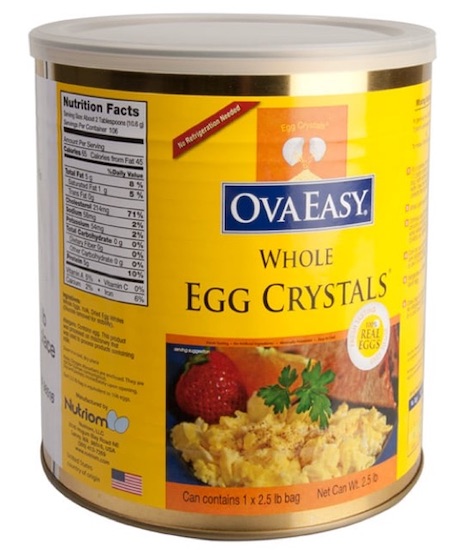
OvaEasy is unique type of freeze-dried egg and is made from a proprietary freeze-drying technology that uses low-temperatures to make a high-quality crystal product with a shelf life of up to seven years. You may find them to be fresher tasting and an improvement over regular dehydrated eggs. They are also more expensive than fresh or dehydrated eggs, but they may be worth it in a crisis.
Egg Substitutes to Use in Baking
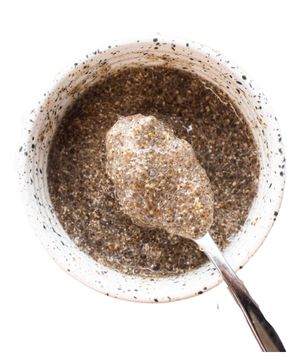
Eggs may be a scarce commodity in a crisis, so it’s helpful to know that you can make substitutions if you are without eggs. In baking try the following substitutes to get the same lightness that eggs provide:
- 2 tablespoons water plus 2 teaspoons baking powder plus 1 teaspoon vegetable oil
- One-fourth cup carbonated water
- One-fourth cup mashed bananas
- One-fourth cup applesauce
- 1 tablespoon of chia seeds plus 3 tablespoons of water
- 1 tablespoon of ground flax seeds plus 3 tablespoons of water
- 1 tablespoon of gelatin plus 1 tablespoon lukewarm water plus 2 tablespoons hot water
Learn More
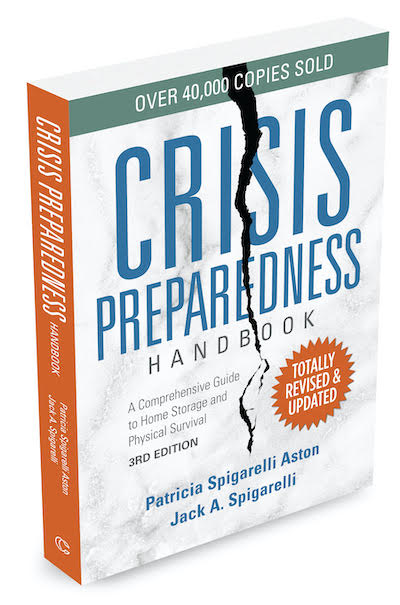
Learn more about all aspects of preparing for a crisis or emergency in Crisis Preparedness Handbook, Third Edition. Learn more about storing food and how to preserve food for storage. Also learn about water storage, sanitation, communication, transportation, and more. The book is available on this website and at Amazon and other book stores.
